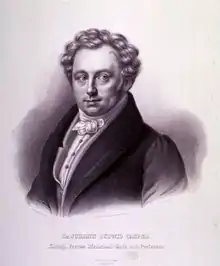Johann Ludwig Casper
Johann Ludwig Casper (11 March 1796 – 24 February 1864) was a German forensic scientist, criminologist, pathologist, pediatrician, pharmacologist, professor and author.
Johann Ludwig Casper | |
|---|---|
 Johann Ludwig Casper by H. Löwenstein, 1832. | |
| Born | 11 March 1796 |
| Died | 24 February 1864 (aged 67) |
| Occupation | |
Casper was born in 1796 in Berlin, Germany. He studied pharmacology and medicine in Berlin, Göttingen and Halle, and he officially graduated with a doctorate in 1819. Casper traveled to familiarize himself with medical science in France and England, and then returned to his native city in 1822. He became a professor at the Medicinal College of the Province of Brandenburg and, in 1824, a private docent at a medical facility. His primary interests were pathology and pediatrics. Casper joined the Scientific Deputation a decade later.
In 1839, he became a professor at the Medicina Forensis and Publica[1] and then the director of an educational institution for forensic medicine in 1841.[2] In 1852, Casper published Über Nothzucht und Päderastie und deren Ermittlung Seitens des Gerichtsarztes.[3] In 1858, he proposed a consistent ratio of the time taken for a body to putrefy in different substances – 1:2:8 in air, water and earth. This would later be known as Casper's Dictum.[4]
Casper may have been the earliest writer to include colored lithographs in books about forensic pathology. Before his sudden death in 1864, Casper published colored lithographs of gunshot wounds in cadavers in his textbook, Atlas zum Handbuch der gerichtlichen Medicin.[5]
References
- Hirsch, August (1876). Allgemeine Deutsche Biographie Vol. IV. Duncker & Humblot.
- Meijer, Bernhard (1905). Nordisk Familjebok Konversationslexikon och Realencyklopedi. V. Leche; J. F. Nystrom; K. Warburg; Th. Westrin. Nordisk Familjeboks Forlags Aktiebolag.
- Casper, Johann Ludwig (1852). Über Nothzucht und Päderastie und deren Ermittlung Seitens des Gerichtsarztes. Vierteljahrsschrift für gerichtliche und öffentliche Medicin. Unter Mitwirkung der Königlichen wissenschaftlichen Deputation für das Medicinalwesen im Ministerium der geistlichen, Unterrichts- und Medicinal-Angelegenheiten.
- Aggrawal, Anil (2014). APC Essentials of Forensic Medicine and Toxicology. New Delhi: Avichal Publishing Company. p. 132. ISBN 9788177394412. Retrieved 14 May 2019.
- Reading Gunshot Patterns. U.S. National Library of Medicine. June 2014. Retrieved 27 July 2017.
External links
- August Hirsch (1876), "Casper, Johann Ludwig", Allgemeine Deutsche Biographie (ADB) (in German), 4, Leipzig: Duncker & Humblot, pp. 58–59